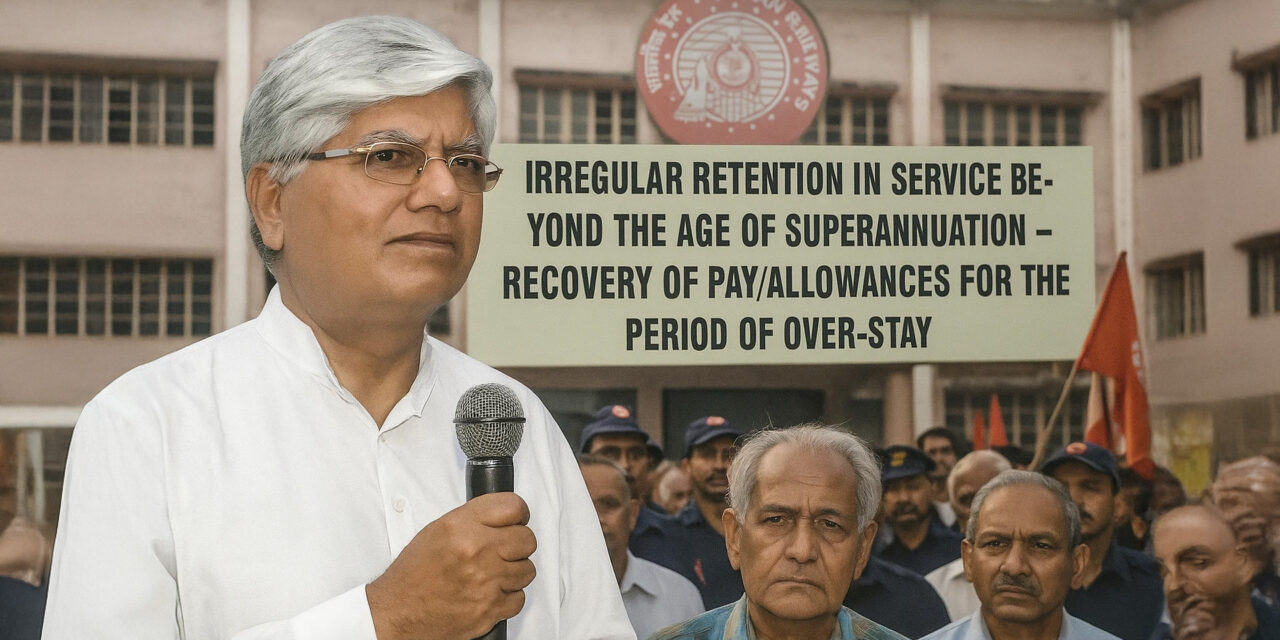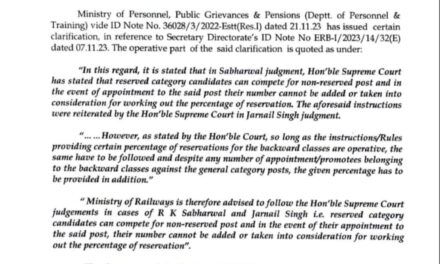No. AIRF/BB (460)t207 (Lt. 6)
Dated 22.09.2025
The Director General (HR),
Railway Board,
Rail Bhawan,
New Delhi.
Sub: Irregular retention in service beyond the age of superannuation – Recovery of Pay/allowances for the period of over-stay
Ref.:
- Railway Board’s letter No, E (G)97/RTU dated 07.07.1999 (Rule 1801(d) of IREC, Vol. – II) (RBE No.139/199e).
- AIRF’s letter no. AIRF/88 (460)dated 06.12.2022, 21.05.2025 & 24.06.2025
- Railway Board’s letter no. E (c)2023/RTl/1 dated 06.05.2025 & 10.09.2025.
This Federation is constrained, once again, to express its deep concern regarding the continued irregular practice of retaining employees in service beyond their prescribed age of superannuation and the consequential recovery of pay and allowances drawn during such unauthorized extension. We had previously drawn attention to this matter through our communications dated 06.12.2022, 21.05.2025 and 24.06.2025 (Ref-2), but the Railway Board, in its replies dated 06.05.2025 and 10.09.2025 (Ref-3), has addressed its inability to amend the existing instructions dated 07.07.1999 after consultation with the Finance Directorate.
We would like to reiterate that the issue is not merely administrative but is deeply rooted in settled judicial principles and humanitarian considerations that the administration cannot overlook. Our earlier representation dated 06.12.2022 referred to the Hon’ble Supreme Court’s landmark decision in Radha Kishan vs. Union of India, where it was categorically held that any service rendered beyond the prescribed age of superannuation, unless specifically authorized, is irregular and such period cannot be regularized for pensionary or other benefits. Pay and allowances drawn during such overstay are liable for recovery. This principle has been duly incorporated into the Railway Board’s guidelines vide letter dated 07.07.1999 issued under Rule 1801(d) of IREC (Vol. II).
Additionally, in State of Bihar & Ors vs. Pandey Jagdishwar Prasad [Civil Appeal No. 7237/2008, decided on 11.12.2008], the Hon’ble Supreme Court observed that even where recovery of pay is not permitted, the period of irregular service cannot be counted for pension or retirement benefits. This judgment emphasizes both administrative discipline and employee equity, forming a sound jurisprudential basis for policy reform.
Further, the Hon’ble Supreme Court’s judgment dated 18.12.2014 in SLP (C) No. 11684 of 2012, along with the DoPT OM No. 18/03/2015-Estt (Pay-I) dated 02.03.2016, clearly specifies circumstances under which recovery of pay and allowances is impermissible, particularly:
- Recovery from employees belonging to Class-III and Class-IV (Group ‘C’ and ‘D’).
- Recovery from retired employees or those due to retire within one year from the date of recovery order.
- Recovery where excess payment has been made for a period exceeding five years prior to the date of recovery order.
The irregular retention of employees beyond superannuation falls squarely within Clauses (ii) and (iii) of Para 4 of the said DoPT OM. Therefore, recovery in such cases is clearly impermissible as per existing guidelines, which also represent the considered view of the Government of India’s administrative and financial authorities.
It is therefore deeply disappointing and concerning that despite these judicial pronouncements and clear DoPT guidelines, the Railway Board has issued a negative response dated 10.09.2025 without conducting a thorough examination of the matter. This reflects not only a lack of procedural diligence but also a disregard for established legal frameworks and the welfare of employees who have served the organization loyally for decades.
We further understand from the Railway Board’s reply that the nodal department for service matters has not issued any instructions in compliance with the Supreme Court’s judgments, leading to the proposal’s rejection. However, this cannot be a justification for perpetuating irregular practices that expose employees to unnecessary hardship and potential litigation. As the custodian of railway administration, it is incumbent upon the Board to align its instructions with the broader legal framework and administrative best practices.
We urge the Railway Board to initiate amendments to Rule 1801(d) of IREC (Vol. II) so that the provision is brought into conformity with judicial pronouncements and humanitarian principles. Such a revision would resolve ambiguity, reduce litigation, enhance transparency, and ensure fairness across the board. It would also safeguard the reputation of the administration and instill confidence among employees that their service is treated with dignity and respect.
In support of this demand, we also draw attention to the following observations from judicial and administrative precedents:
- In Union of India vs. Major General S.P. Sinha [(1998) 7 SCC 151], the Court emphasized that government servants cannot be subjected to retrospective penal action where administrative lapses are not wilful or deliberate, and policies must be aligned with equity and justice.
- In People’s Union for Civil Liberties vs. Union of India [(2003) 4 SCC 399], the Court highlighted that fairness, consistency, and compassion form the cornerstone of administrative justice, especially where vulnerable groups are concerned.
- The DoPT OM dated 02.03.2016 reflects a conscientious effort to avoid undue hardship to lower-rank employees, balancing accountability with equity, a principle that should be extended to irregular retention cases.
It is therefore imperative that Railway Board not only reviews the matter but also convenes an urgent, structured meeting involving all stakeholders, administrative, financial, legal, and employee representatives, to deliberate upon this issue comprehensively and frame a policy that reflects both the rule of law and administrative responsibility.
We trust that the Railway Board will appreciate the gravity and sensitivity of this matter and act expeditiously to resolve it in a manner that upholds justice, prevents avoidable litigation, and ensures humane treatment of employees.
We look forward to your positive and prompt intervention.
Yours sincerely,
(Shiva Gopal Mishra)
General Secretary
Copy to: General Secretary, WREU, Grand Road Station Building (East), Mumbai – For information.





